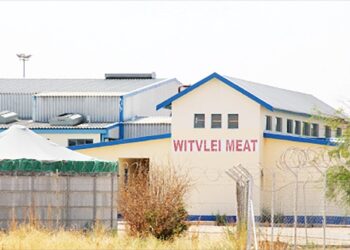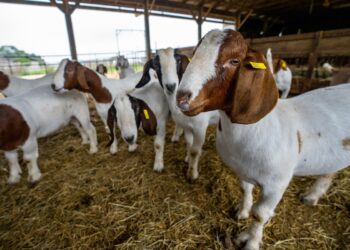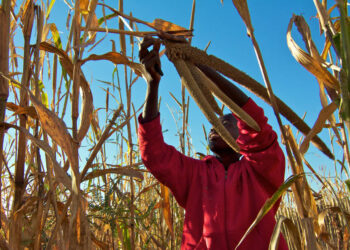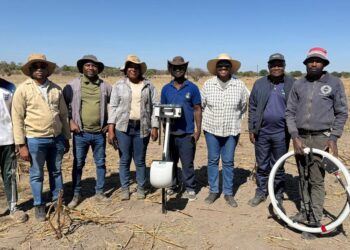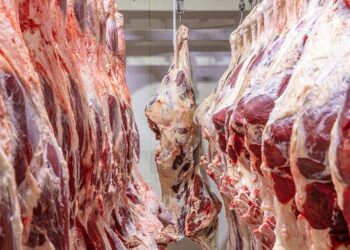
A good rainy season should be perceived as one that starts in time as anticipated, is well distributed throughout the season, and ultimately rehydrates the soil, refills water sources, and revegetates the rangeland. However, of recent, rainfall activities are conspicuously erratic, and their effects can be a concern.
To this end, although rainfall brings relief to farmers, it is also associated with several adverse conditions that affect the farm environment as well as livestock and crops in particular. The conditions include lightning strikes, floods, mud traps, and pests and disease outbreaks.
These conditions pose a significant threat to livestock health, nutrition, and their general wellbeing, consequently compromising their productive performance and survival. Therefore, farmers need to be wary of these threats brought about by rainfall and find means of mitigating the consequences.
The occurrence of pests has been a common threat in Namibia. For example, the outbreak of army worms in recent years in the northern regions, and the outbreak of locusts in the southern regions had a devastating impact on productivity and livelihoods. Crop farmers lost their yields to worms, and livestock farmers in the south lost grazable materials (grass) to locusts.
Moreover, livestock diseases during rainfall are highly prevalent, and the common ones that farmers should look out for include, footrot, sweating sickness, gall sickness, and lumpy skin disease amongst others. Footrot is a bacterial infection of the hoof, characterized by lameness and a smelly wound on the hoof. The predisposing factors include dampness or wet soils.
Footrot can be prevented by keeping animals out of damp kraals or surfaces. The treatments include cleaning and disinfecting the wound, use of footbaths (e.g. coper sulphate solution) at kraals, and injection with common antibiotics (e.g. Disulfox, Terramycin etc.) when necessary.
Furthermore, with the prevailing moist environment, the tick population is on the rise and thus, the prevalence of tick-borne diseases such as “sweating sickness†and “gall sickness†should be expected. Sweating sickness mainly affects young calves, and the symptoms amongst others include hyperthermia (high body temperature), anorexia (loss of appetite), sweating, hair loss, sensitivity and pain.
Gall sicknessÂ
Anaplasmosis is characterized by fever and anaemia (loss of blood). It is important to note that, these diseases are deadly if not treated in time. Moreover, they can be prevented by controlling tick infestations by means of applying common anti-parasitic remedies on animals such as Deadline, Eliminate, Delta-pour and many others that you can pour on, along the backline of the animal.
Others include dipping remedies that should be mixed with water, for example Coperzon30, Agra dip-cyp, etc. In addition, humans are also at risk of tick bites as some ticks carry Congo fever virus.
Congo fever is a deadly viral disease that can be transmitted to humans through a bite by the tick carrying the virus. It is worth noting that there have been cases of Congo Fever infections reported in the country in recent years. Therefore, every person on the farm or handling animals should always take precautionary measures and seek immediate assistance from the health professionals for tick bites.Â
Another disease that is gaining prevalence during the rainy season in the country is Lumpy Skin Disease (LSD). LSD is a viral disease affecting cattle that is transmitted by biting insects such as flies, ticks, and mosquitoes amongst others. The predisposing factor is a wet environment that influences the proliferation of insect populations.
Animals are vulnerable as they are found loafing around water holes and sources that are breeding grounds for insects such as mosquitoes. LSD is however preventable with an annual vaccine readily available at veterinary medicine shops.
Lastly, it is advisable that farmers keep their farming environments clean and safe for themselves and their animals, and always observe and report abnormal livestock conditions or behaviours to the nearest veterinary office or livestock health experts.
Lastly, farmers should note that each rainfall season is unique in terms of commencement, distribution, intensity and associated risks, thus, farmers need to adopt appropriate management strategies to circumvent possible adverse conditions.
* Erastus Ngaruka is aTechnical Advisor (Livestock & Rangeland) at Agribank
Â


